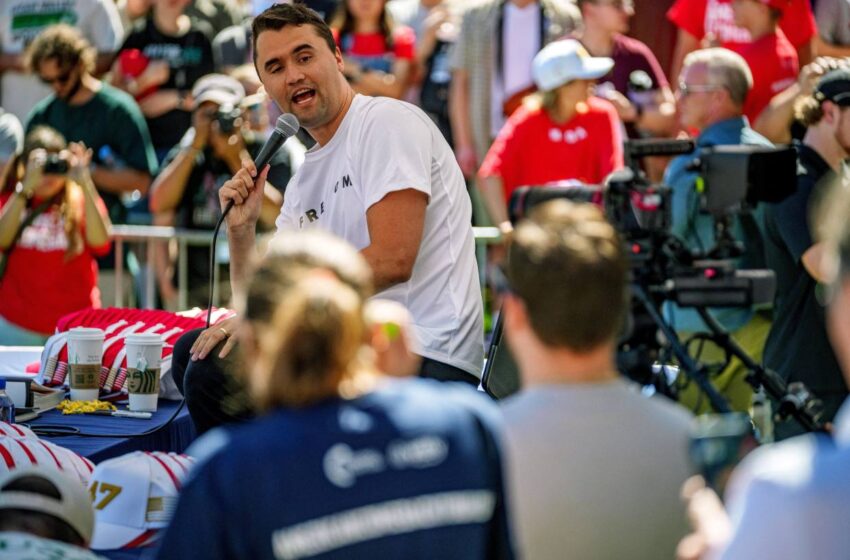Who killed Charlie Kirk? What we know so far

Late Turning Point USA founder, Charlie Kirk. Photo Credit- The Wall Street Journal
Charlie Kirk, the founder of Turning Point USA and one of America’s most recognizable conservative voices, was shot and killed on September 10, 2025, while speaking at Utah Valley University in Orem, Utah. The incident, which occurred during a public event, sparked chaos as attendees fled the scene after a single gunshot rang out. Kirk was rushed to the hospital but later pronounced dead. Authorities quickly described the shooting as a targeted attack, drawing the involvement of both local law enforcement and federal investigators.
Who Charlie Kirk Was
Born on October 14, 1993, Charles “Charlie” James Kirk rose to prominence as a teenager when he co-founded Turning Point USA in 2012. Over the years, he transformed the group into a formidable youth-oriented conservative movement, organizing on college campuses across the country. Kirk became known not just as an activist but also as a media figure—hosting podcasts, writing books, and appearing regularly on television as a defender of conservative ideals. With his sharp rhetoric and combative style, he amassed a significant following, particularly among young conservatives who viewed him as a voice of their generation.
READ ALSO
Charlie Kirk shot dead: What to know about Turning Point USA founder
Beyond his leadership of TPUSA, Kirk cultivated strong ties with prominent Republican leaders and positioned himself as an influential figure within the Trump-aligned wing of the party. His activism made him a powerful force in mobilizing voters, especially on issues of culture, education, and free speech. However, his high profile also meant he was a lightning rod for controversy. Critics often accused him and his organization of spreading misinformation and fueling division on college campuses, while supporters praised him for challenging liberal orthodoxy and defending conservative students who felt marginalized.
Once again, a bullet has silenced the most eloquent truth teller of an era. My dear friend Charlie Kirk was our country’s relentless and courageous crusader for free speech. We pray for Erika and the children. Charlie is already in paradise with the angels. We ask his prayers for… pic.twitter.com/ReOdkT6VbV
— Robert F. Kennedy Jr (@RobertKennedyJr) September 10, 2025
The Event and Its Aftermath
The attack unfolded during Kirk’s “American Comeback Tour” stop at Utah Valley University. Eyewitnesses reported that Kirk was interacting with the crowd when the gunfire erupted, sending people scrambling for safety. Law enforcement quickly secured the area, detaining some individuals, though initial arrests were later clarified as unrelated to the shooting. Federal authorities, including the FBI, were brought into the investigation as officials suggested that the killing appeared to be targeted. The evolving nature of the case left many details unclear in the hours and days that followed, including whether a suspect had been positively identified or apprehended.
Possible Motives
Investigators have not yet provided a definitive motive for Kirk’s killing, but several possibilities are under consideration. Some officials characterized the attack as a political assassination, noting Kirk’s prominence and the highly visible setting of the event. Others suggested the shooter could have been an ideologically motivated lone actor—a phenomenon that has become increasingly common in the age of online radicalization. At the same time, investigators have not ruled out personal grievances or non-political motives, which can sometimes present as politically driven violence. Another possibility is that the attack was opportunistic, exploiting the vulnerabilities of a crowded public event where a figure like Kirk was accessible to the public.
At this stage, all explanations remain speculative, and authorities caution against drawing firm conclusions until forensic analysis, digital evidence, and witness accounts are fully examined.
National Reaction
Kirk’s death sent shockwaves across the political spectrum. Lawmakers and public figures, both allies and critics, condemned the violence as a dangerous escalation in America’s already polarized political climate. For conservatives, Kirk’s killing was viewed as a direct assault on their movement, while others called for measured reflection on how toxic rhetoric and political hostility may fuel violence. Editorials and commentators highlighted the broader pattern of politically motivated attacks in recent years, underscoring growing concerns about the safety of activists, politicians, and public figures in the United States.
What Comes Next
The coming weeks will likely provide more clarity as investigators release new findings. Attention will focus on whether a suspect is identified and charged, what evidence emerges about the attacker’s motive, and how this incident reshapes security protocols for public events. Turning Point USA and allied conservative groups are expected to play a central role in shaping the narrative, balancing tributes to Kirk’s legacy with calls for greater protection of political figures.
I am deeply disturbed by the shooting in Utah. Doug and I send our prayers to Charlie Kirk and his family.
Let me be clear: Political violence has no place in America. I condemn this act, and we all must work together to ensure this does not lead to more violence.
— Kamala Harris (@KamalaHarris) September 10, 2025
Charlie Kirk’s death marks a turning point in America’s political discourse, highlighting not only the vulnerability of public figures but also the dangers posed by a climate of growing hostility. While the full truth about why he was killed remains under investigation, the event has already become a symbol of the country’s fraught political moment.

